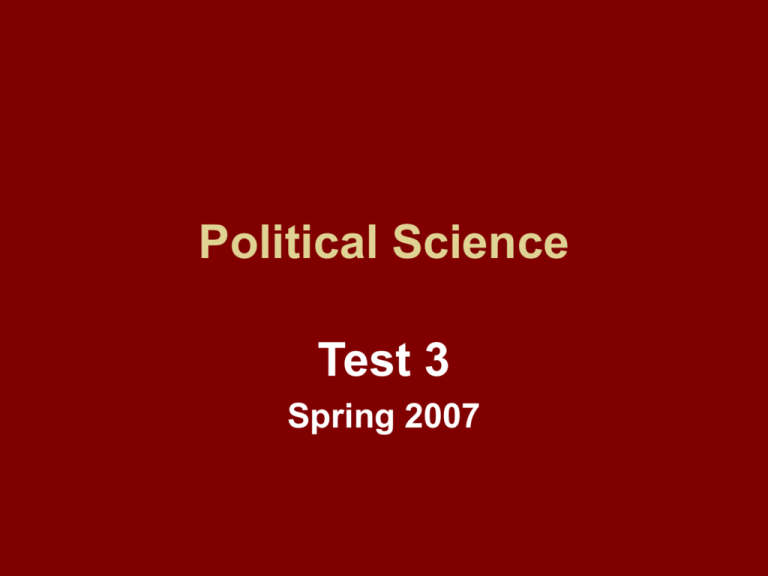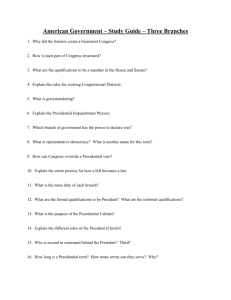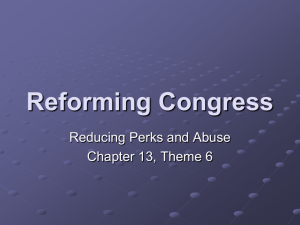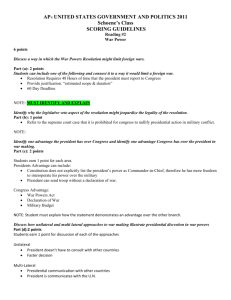Political Science Test 3
advertisement

Political Science Test 3 Spring 2007 Chapter 9 Question • 1. Definition: A party’s statement of its positions on the issues of the day. • party platform Question • Definition: The programs of the administration of President Franklin Delano Roosevelt. • The New Deal Question • According to the text, Struggle for Democracy, political parties contribute to democracy by • making office holders accountable to voters Question • According to the authors of Struggle for Democracy, the Founders were hostile to political parties • Even though they themselves formed two distinct political parties. Question • According to the text, Struggle for Democracy, American politics is primarily what? • candidate-centered Question • Definition: The political position that holds that the federal government has a substantial role to play in the economic regulation, social welfare, and overcoming racial inequality. • liberal Question • Definition: The political position that holds that the federal government ought to play a very small role in economic regulation, social welfare, and overcoming racial inequality. • conservative Question • When did the present-day competition between the two specific parties, that is, Republicans verses Democrats, first take place? • 1856 Question • What was the essence of the major shift of alliances between the two major parties since 1964? • Anti-integration Southern Democrats shifted from the Democratic to the Republican Party Question • With the change of identification from party affiliation to the ideological paradigm of Liberal verses Conservative what problems arise? • The identification is largely subjective and doesn’t always accurately reflect true ideology Chapter 10 Question • Definition: The proportion of eligible voters who actually vote in a given election is called what? • turnout Question 20 • Definition: The tendency to vote for the incumbents when times are good and against them when times are bad. • electoral reward and punishment Question • Definition: A form of voting in which voters look back at the performance of a party in power and cast ballots on the basis of how well it did in office. • retrospective voting Question • Definition: Political activity, including voting, campaign activity, contacting officials, and demonstrating. • participation Question • Definition: Two words that mean “The right to vote.” (Please review all options) • suffrage & franchise Question • According to both texts (Struggle for Democracy and The Lanahan Reader) and according to class lectures about what percentage of Americans vote in each presidential election? • fifty percent Question • Definition: Expenditures by political parties on general public education, voter registration, and voter mobilization is called what? • soft money Question • According to the authors of Struggle for Democracy, in democracies, the chief means by which citizens control the government is (are) supposed to be what? • elections Question • In the early years of the United States, the franchise to vote was held by what group? • property-owning white males Question • Until the presidential election of 2000 what was the position of the courts regarding elections? • Courts only influenced elections by disallowing classes of ballots, such as absentee or from a specific machine. Question • Definition: State elections in which delegates to national presidential nominating conventions are chosen. • Primary Elections Chapter 11 Question • Definition: Redrawing electoral district lines to give an advantage to a particular party or candidate. • gerrymandering Question • Definition: The powers of the Congress and the federal government specifically mentioned in the Constitution. • Enumerated powers Question • What institution regulates Congress? • Congress Question • What person will become president if both the president and the vice president can no longer serve in office? • Speaker of the House of Representatives Question • Definition: Article 1, Section 8 of the Constitution, also called the necessary and proper clause; gives Congress the authority to make whatever laws are necessary and proper to carry out its assigned and specified responsibilities. • Elastic clause Question • Definition: The legal doctrine that a person who is arrested must have a timely hearing before a judge. • Habeas Corpus Question • Definition: According to the doctrine articulated by Edmund Burke, an elected representative who acts in perfect accord with the wishes of his or her constituents. • delegate Question • Definition: Reallocation of House seats among the states, done after each national census, to ensure that seats are held by the states in proportion to the size of their populations. • reapportionment Question • Definition: The redrawing of congressional district’s lines within a state to ensure roughly equal populations within each district. • redistricting Question • Definition: Projects designed to bring to the constituency jobs and public money for which members of Congress can claim credit. • Pork or pork barrel Chapter 12 Question • The domestic economic reality of the late 19th century which led to an increase in presidential power was what? • The accumulation of wealth and power by an elite made up of industrialists Question • One of the major factors increasing the power of the office of the President was what? • America’s emergence as a world power Question • Definition: Relatively permanent congressional committees that address specific areas of legislation. • Standing committees Question • Definition: The taking of testimony by a congressional committee or subcommittee. • Hearings. Question • Definition: The process of revising a bill in committee. • markup Question • Definition: Congressional committees with members from both the House and the Senate. • Joint committees Question • Definition: A vote to end the “unlimited debate” or a standard debate; requires the votes of three-fifths of the membership of the Senate. • Cloture Question • Definition: Legislative action taken “without objection” as a way to expedite business; used to conduct much of the business of the Senate. • Unanimous consent Question • Definition: Deferral by members of Congress to the judgment of subjectmatter specialists, mainly on minor technical bills. • reciprocity Question • Definition: The parliamentary device used in the Senate to prevent a bill from coming to a vote by “talking it to death,” made possible by the norm of unlimited debate. • filibuster Question • There is an obvious paradox in conservative ideology regarding presidential power. What statement describes that paradox? Answer • Conservatives oppose the power of the federal government, yet think the only legitimate power of the president is foreign relations and defense, but it has those two areas of presidential responsibility which have most increased presidential power and federal authority. Lanahan Readings Question • From the Lanahan Readings, Reading Number 16, From Congressional Government by President Woodrow Wilson– What was unique about President Wilson’s background? • He had a doctorate Question 34 • In Reading 22, from Congress: The Electoral Connection by David Mahew, the author portrays United States congressmen as what? • single-minded seekers of reelection Question • In Reading Number 23, from Home Style by Richard Fenno, where do most members of Congress spend a substantial proportion of their time? • at home– meaning in their home districts. Question • In Reading Number 23, from Home Style by Richard Fenno, the author states that members of Congress have two primary policy justifications, that is, philosophies for how the represent constiuents, they are: • delegate and trustee Question • In Reading Number 28, from Pork: A TimeHonored Tradition Lives On by Paul Starobin, according to the author when did federal politicians first begin to legislate “pork”? • from the very beginning Question • In Reading Number 29, from In Praise of Pork, by John Ellwood and Eric Ptashnik, what is the definition offered by the author for the term “pork.” • Congressional spending on projects that bring money and jobs to particular districts which aid reelection. Question • In Reading Number 39, from Locked in the Cabinet by Robert Reich, in what president’s cabinet did he serve? • Clinton






